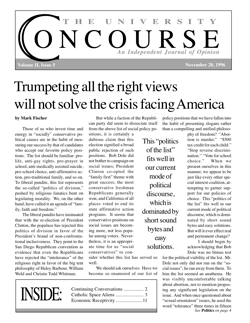Sexism in any form denigrates both men and women
by Michael Healy
I would like to thank Elizabeth Magaletta for her October 16 article entitled, “The Persistence of ‘Masculinism’ at Franciscan University.” I found this article especially interesting because I had thought that many people at this University valued femininity over masculinity. Seeing that Ms. Magaletta held the opposite opinion led me to examine both my viewpoint and hers more closely. I concluded that we were both right and both wrong—in a way. This conclusion will need to be explained, but first let me mention two possible shortcomings in Ms. Magaletta’s article.
First, there may be an inconsistency. In the tenth paragraph she writes, “We have never needed a defense of the rights of men against the aggressions of women; and so I use ‘masculinism’ expressly to designate that view of life in which the concerns of men subsume everything else. Male superiority is not so much a part of this view as its guiding principle.” However, in the previous sentence she had said that in radical feminism “the special focus on women has subsumed everything else.” If radical feminism subsumes everything else to the needs of women and what she calls “masculinism” subsumes everything else to the needs of men and she considers masculinism to be an attack on women, does it not follow that she should consider radical feminism to be an attack on men? Yet she denies that masculinity needs to be defended against the aggressions of certain women.
This brings me to a second shortcoming in her piece. I say “certain women” because it would be false and misleading to eliminate the qualifier certain. Unfortunately, Ms. Magaletta does just this when she describes feminism as “a movement especially aimed at defending the rights and dignity of women against the aggressions of men.” Would it not have been better to have qualified this statement by saying instead that feminism defends women against the aggressions of certain men? Otherwise, she unjustly accuses all men of masculinism.
Now I will try to show how I think both Ms. Magaletta and I have falsely evaluated the situation. Interestingly, some of the very things that Ms. Magaletta sees as attacks on femininity I once saw as attacks on masculinity. The truth doubtless lies between, so to find it I will take each of these opinions and show how it could cut both ways.
In the sixth paragraph of her article Ms. Magaletta points out how viewing women in regard to their receptivity during sexual intercourse leads to their being seen from an exclusively male standpoint. As the natural result of this, “what seemed to be a discussion of the differences between men and women turns out rather as one of the difference of women from men.” On the other hand, viewing a list of how woman differs from him may convince man that those differences are too many and too great to be overcome. This, in turn, may convince him that he would be inadequate as her husband and she as his wife. This could leave him deeply depressed. Therefore this point of view, whether its proponents and opponents realize it or not, is an attack on all the members of both sexes.
Ms. Magaletta rightly complains that concentrating on woman’s subjectivity may lead one to question whether she can be objective. However, it is equally true that concentrating on a man’s objectivity may lead one to question whether he can be subjective. She also rightly complains that a woman’s “nurturing aspect” can be used to cut “her out of spheres where emotion is not of primary importance.” However, the same argument could be used to cut men out of spheres where emotions are important. Again, insisting that women are only suited to homemaking could lead to insisting that no man could ever be a homemaker. Again and again the claims which seem, on the surface, to attack one of the sexes turn out to attack both, once one thinks them through.
In the next-to-last paragraph of her article Ms. Magaletta points out that what she calls “masculinism” survives by disguising itself and lavishly praising women. She points out that to those who see woman as inferior this inordinate praise of women is not seen as an attempt to establish female dominance. However, to a man who sees woman as his equal it can look like an attempt to advance women at the expense of men. Here again an attack on woman is an attack on man, and vice versa.
This suggests that those whom Ms. Magaletta terms “masculinists” and “radical feminists” actually have the same mindset. They see how certain points are attacks on their own sex and also see how they may attack the opposite sex through certain other points. They do not see that, because men and women are equals, every insult to one sex also denigrates the other sex. Therefore, what we need today is not a defense of women from men or a defense of men from women. We need a defense of the members of both sexes from the attacks of those—whether male or female—who would reduce them to pale reflections of their true selves.
Michael Joseph Healy, Jr., Freshman, Classics
Michael Healy is not related to the usual Concourse Healys; he is, however the son of Dr. Michael Healy, Dean of Faculty.


